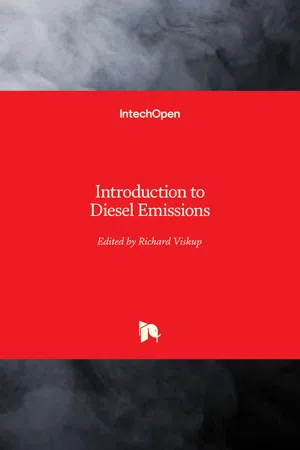
- 132 pages
- English
- PDF
- Available on iOS & Android
Introduction to Diesel Emissions
About this book
The first invention and development of the functional diesel engine was in 1897 by Rudolf Christian Karl Diesel, German inventor. Until now, this invention has been superseded by the development of very productive engines and mechanics. Current diesel engines are well known to many people around the world and serve in innumerable applications for various types of public transport, light and heavy duty transportation, for automotive, railway, maritime or aviation transportation, in different harsh environments, in construction, in mining, and for diverse industries. The light duty or heavy-duty diesel engines have some drawbacks. One of the main concerns is connected with exhaust emissions generated by diesel engines. This book discusses the generation of diesel exhaust emissions and mitigations, performance, emissions and combustion evaluations, utilisation of alternative biodiesel fuels, comparison of different techniques for measurement of soot and diesel particulate matter, analyses of diesel particulate matter flow pattern, and chemical composition of diesel particulate matter. The main concern of this book is to expand knowledge of readers and bring together the latest research findings related to diesel engine exhaust emissions.
Frequently asked questions
- Essential is ideal for learners and professionals who enjoy exploring a wide range of subjects. Access the Essential Library with 800,000+ trusted titles and best-sellers across business, personal growth, and the humanities. Includes unlimited reading time and Standard Read Aloud voice.
- Complete: Perfect for advanced learners and researchers needing full, unrestricted access. Unlock 1.4M+ books across hundreds of subjects, including academic and specialized titles. The Complete Plan also includes advanced features like Premium Read Aloud and Research Assistant.
Please note we cannot support devices running on iOS 13 and Android 7 or earlier. Learn more about using the app.
Information
Table of contents
- Introduction to Diesel Emissions
- Contents
- Preface
- Section 1 - Diesel Engine and Exhaust Emissions
- Chapter 1 - Diesel Exhaust Emissions and Mitigations
- Chapter 2 - Performance, Emissions, and Combustion Evaluations of a Diesel Engine Fuelled with Biodiesel Produced from High FFA Crude Mahua (Madhuca longifolia) Oil
- Section 2 - Biodiesel and Alternative Fuels
- Chapter 3 - Alcohol Contribution over Conventional Fuel
- Section 3 - Soot and Diesel Particulate Matter
- Chapter 4 - Comparison of Different Techniques for Measurement of Soot and Particulate Matter Emissions from Diesel Engine
- Chapter 5 - Analysis of Diesel Particulate Matter Flow Patterns in Different Ventilation and Operational Conditions of Underground Mines
- Chapter 6 - Major Chemical Elements in Soot and Particulate Matter Exhaust Emissions Generated from In-Use Diesel Engine Passenger Vehicles